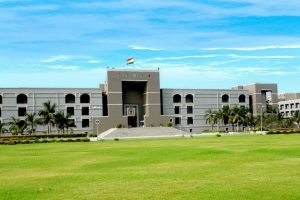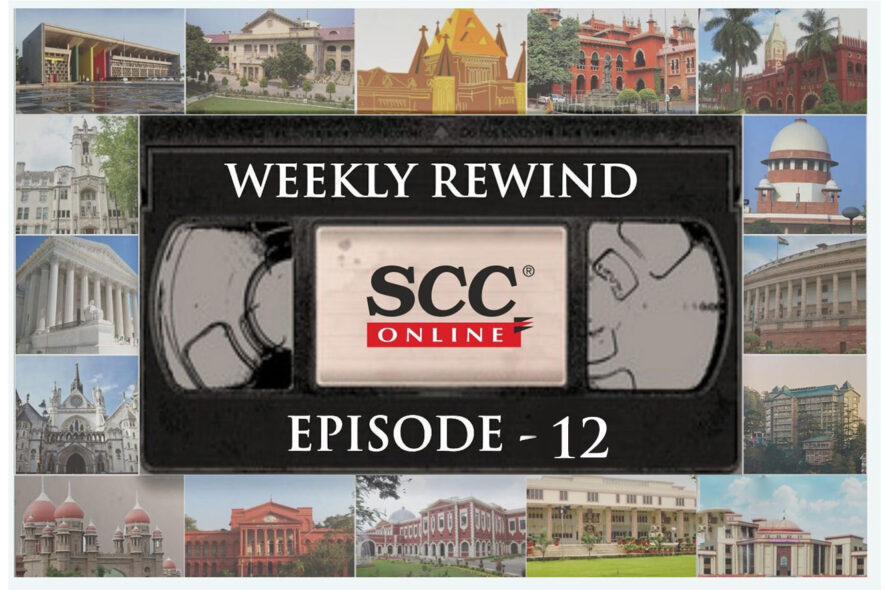The 12th Episode of SCC Online Weekly Rewind featuring Devika Sharma, Senior Legal Editor bringing you the most important and interesting stories from the field of law is out now! Check out the written episode below.

TARUN TEJPAL CASE
22-pointer comprehensive analysis of Tarun Tejpal’s acquittal order
The most highlighted development of the week was the judgment of the Additional Sessions Court at Mapusa, Goa, which acquitted Tarun Tejpal, former Editor-in-Chief of Tehelka, who was accused of committing rape on a journalist. The court gave benefit of doubt to Tejpal, noting crucial lapses in investigation and major contradictions and improvements in testimony of the prosecutirx. The incident is of 2013 which allegedly happened during THiNK Fest, organised by Tehelka in Goa that year. Now, the State of Goa has appealed against this order before the Bombay High Court. We have studied the entire 527-pages judgment of the Sessions Court and prepared a 22-pointer comprehensive analysis.
https://www.scconline.com/blog/post/2021/05/28/rape-accused-tarun-tejpal/
SUPREME COURT

Courts need to be extra careful while dealing with Dowry Death cases; Guidelines issued
Now moving to the Supreme Court, In an important ruling, the Supreme Court has held that Courts need to be extra careful while conducting criminal trials relating to Section 304B, IPC that deals with Dowry death.
The Court expressed grave concern on the fact that, often, Trial Courts record the statement of an accused under Section 313, CrPC in a very casual and cursory manner, without specifically questioning the accused as to his defense. The Court said that the examination of an accused under Section 313, CrPC cannot be treated as a mere procedural formality, as it is based on the fundamental principle of fairness.
The Court hence issued elaborate guidelines on trial of dowry death cases.
Apprehension of COVID-19 a ground for anticipatory bail: Supreme Court stays Allahabad High Court’s order
In another matter, A vacation bench of the Supreme Court stayed the Allahabad High Court’s order wherein it was held that apprehension of being infected with COVID-19 after coming into contact with authorities was a valid ground for anticipatory bail.
The High Court had granted anticipatory bail to one Prateek Jain “on account of special conditions and on special ground” and had also issued direction on grant of anticipatory bail on such special grounds.
The Supreme Court staying the said order, directed that the Courts shall not consider the said directions while considering applications for anticipatory bail and must decide each case on its merits.
HIGH COURTS
Delhi High Court

Seizure by police of oxygen concentrators and Covid-related equipment sold at high-profit margins. Is it illegal?
In another matter, the Delhi High Court has confirmed that it is legal for the police to seize oxygen concentrators and other Covid-related equipment being sold at high profit margins in contravention of laws, rules and executive orders.
https://www.scconline.com/blog/post/2021/05/27/oxygen-concentrators/
Madras High Court

Malicious prosecution: What, how and who, discussed
Down south, The madras High Court has held that to succeed in a suit for malicious prosecution, the acquittal of the plaintiff alone is not sufficient. Rather, the plaintiff is obliged to prove (i) that the prosecution was without any reasonable and probable cause, and (ii) that it was instituted with a malicious intention, and (iii) that he suffered damage.
Apart from this, the Court also discussed, in detail, the duty of civil court in cases relating to malicious prosecution and also the burden of proof.
https://www.scconline.com/blog/post/2021/05/25/malicious-prosecution/
Gujarat High Court

Compounding of offence under S. 138 NI Act after conviction can be allowed in exceptional circumstances
In a ruling on Negotiable Instruments Act, the Gujarat High Court compounded an offence under Section 138 of the Negotiable Instruments Act and set aside the conviction and sentence of the accused, while observing at the same time that generally powers under Section 482 CrPC are not to be exercised when a statutory remedy is available under law but considering the fact that the parties have settled the dispute amicably, the compounding of the offence was permitted.
https://www.scconline.com/blog/post/2021/05/26/section-138-ni-act-4/
Madhya Pradesh High Court

Directions issued to Police, Judicial Magistrates on arrests and bail
On bail jurisprudence, The Madhya Pradesh High Court has issued elaborate directions to Police and Judicial Magistrates in relation to arrests and bail after it noticed that District Judiciary is extremely tight-fisted when it comes to granting bail.
The Court noticed that applications are being routinely dismissed on cyclostyled grounds that the offence alleged is serious or that the investigation is still in progress or that the accused may influence the witnesses. In such circumstances, huge burden of bail matters has been shifted to the High Court. Hence, the issuance of certain directions was necessary.
Jammu and Kashmir High Court

Bail cannot be granted on the ground of delay unless the matter was pending for 5 years or more
In another bail matter, the Jammu and Kashmir High Court held that bail cannot be granted on grounds of delay unless the matter was pending for 5 years or more.
In the case before the Court, though the applicant had been behind the bars for over 13 years, but the appeal against the order of conviction and sentence dated 23rd July 2020 was filed only in August 2020.
Punjab and Haryana High Court

All-men SIT to investigate a rape case: Insensitive and deplorable
In an important matter, a case where an all-men SIT was deployed to investigate a rape case, the Punjab and Haryana High Court said that it was rather intriguing that no lady police official was involved, which is even otherwise the requirement of law in cases of this kind.
The case pertains to 38-year-old widow giving into the sexual demands of CIA officials, after her 19-year-old son was picked up by them in broad day light while he was recovering from Covid-19 infection at his residence. The woman had also alleged that an FIR, allegedly a fake one, was registered against her son under NDPS Act by planting contraband on him so as to arm twist the petitioner.
Reacting to the allegations, the Court said that the same are so grisly and frightful, one can only hope, that the same are fictitious.
LEGISLATION UPDATES
Union Ministry of Health approves guidelines for ‘Near to Home COVID Vaccination Centres (NHCVC) for elderly & differently-abled citizens

The Union Ministry of Health has accepted the recommendations by the National Expert Group on Vaccine Administration for Covid-19 on the proposed guidelines for Near to Home COVID Vaccination Centres for Elderly & Differently Abled Citizens.
The Technical Expert Committee’s recommendations are aimed to ensure vaccination of Senior Citizens and Differently Abled population having limited mobility due to their physical condition.
Information Technology (Intermediary Guidelines and Digital Media Ethics Code) Rules, 2021

The Information Technology (Intermediary Guidelines and Digital Media Ethics Code) Rules, 2021 were notified by the Ministry of Electronics and Information Technology in February, 2021. The Rules provided three-month timeline to social media intermediaries in order to comply with the New IT Rules by May 26, 2021.






